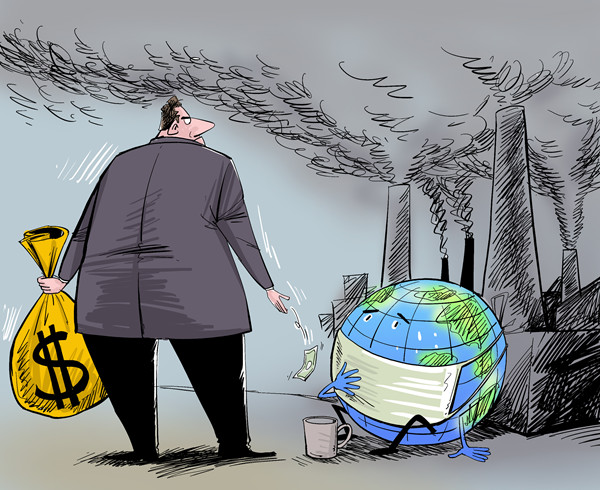It's easier to buy masks than to tackle the haze
- By Wan Lixin
 0 Comment(s)
0 Comment(s) Print
Print E-mail Shanghai Daily, December 11, 2013
E-mail Shanghai Daily, December 11, 2013
While waiting for the elevator in the office lobby on Monday morning, I could not but overhear an exchange between two young women.
|
|
|
Cut the cost [By Gou Ben/China.org.cn] |
“Today I will go to the shops again, to see if they have any masks left, even if they do not protect against PM2.5,” one woman said, adding, “Last Friday was really terrible.”
For your information, shops these days are running out of masks and home air purifiers.
In the era of consumption, it is very easy for us to see ourselves as no more than victims, and very difficult for us to look beyond consumption for redress.
We like to attack the poison with poison.
So people today are talking about shopping their way out of the haze.
I would not be surprised if the market sentiments are somewhat lifted by the latest spell of haze.
On that terrible morning last Friday, I happened to go through a high-end residential area in the Hongqiao area, with villas, condos, manicured lawns, trees, and, lo and behold, all these hallmarks of the good life were shrouded in an eerie look of dusk.
The great equalizer
For a brief moment I was tempted to think of haze as a great equalizer, for people, irrespective of their wealth, are alike enveloped and compelled to choke on it.
Then I thought of these get-rich-first people as big spenders and big emissions contributors. In one way, the all-pervading haze confronts the big spenders with the consequences of their high life, but they do not repay the full measure in view of their contribution — think of their villas, their huge utility bills, their cars, and their extravagance.
But it’s not just those big spenders. We small spenders are also contributing to the mess in our own way.
To say the least, we are all energy consumers.
In Ernest Freeberg’s book “The Age of Edison,” he writes that “in the densest parts of urban America, the world had grown darker.”
The reason?
“Coal consumption skyrocketed in the rapidly growing cities and industrial valleys, providing heat to residents and driving the steam engines of an increasingly mechanized economy.”
He noted the irony that “coal-powered electricity produced both smoke and light, the poison and the antidote.”
This is a very thoughtful observation.
It sets us thinking about the essence of enlightenment, progress, and prosperity -— the electric power, whose consumption is, for good reasons, a very good measure of consumer affluence and industrial activity.
Someone else’s poison?
When Edison first invented the light bulb, it used direct current powered by nearby smog-belching power plants. Bright, but very dirty.
It became cleaner when Nikola Tesla switched to alternating current, which allows energy to be transmitted over long distance.
In other words, it allows power stations to be built in someone else’s backyard.
Today electricity is perceived as clean, even environmental friendly, because it can be generated in backwaters thousands kilometers away from our home. Out of sight, out of mind.
Technology would have continued to be comfortably insulated from these dirty power plants, if it were not for this embarrassing wind, or atmospheric conditions.
Any power plant. For instance, nuclear power is very clean because we have actually mastered the art of leaving the mess to future generations.
So last Friday, on that horrible, record-hitting day, when I could scarcely see the ground from our 38th floor, I could still see the ornamental lights atop a nearby high-rise, piercing defiantly through the haze, resplendent.
We have just survived one of the worst poisonings in living memory, and all our agony and suffering fail to help us relate this mess to those ornamental lights, the cars, the all and sundry urban amenities, or the ever longer shopping list.
Most of us still think it is someone else’s poison.







Go to Forum >>0 Comment(s)